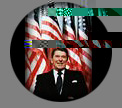 Reagan had a heroic image and a lot of luck. |
|
RONALD REAGAN
Is former United States President Ronald Reagan a hero? Those who think so point out the highlights of his presidency: the ending of the Cold War, the economic success of a free-market era, and a shift away from big government in favor of individual liberty. Those who disagree are quick to name the downsides of his administration: economic policies that benefited the rich while stripping away support for the poor, a conservative stance that harmed the interests of women, and weak enforcement of civil rights laws and other measures designed to limit racial discrimination. So is he a hero? Perhaps the best answer is this: Reagan had a heroic image and a lot of luck. The beginning of his presidency was full of both. At Inauguration Day, his acting skills set a grandiose tone for his first term: "Unlike his predecessors, he had seen no reason to take the oath of office behind the Capitol, in the shade, overlooking a dull parking lot. Instead, he staged the ceremony on the great building's front terrace, where he could feel the sun on his face Ö He directed his oratory down the sweep of its steps, the slope of its park, reverberantly onward and outward, through loudspeakers and monitors and transistors, along the expanding angles of Pennsylvania and Maryland Avenues and the grand axis of the Mall, crowded with thirty-two thousand people, across the Potomac and over the Blue Ridge Mountains, west, west, west," wrote Edmund Morris, in Dutch, a Memoir of Ronald Reagan. And then came the luck. On Reagan's first day in office, the Iran hostage crisis ended. Fifty-three Americans, who had been held in Teheran since November 1979, were released to the United States. Two months later, after Reagan had been shot, the dual combination of good fortune and a strong image again struck a favorable chord with Americans. Right before the surgery to remove the bullet that lay an inch from his heart, Reagan cracked a joke. "Honey, I forgot to duck," he told his wife. His recovery from the operation was miraculously fast. The morning after he was shot, Reagan was meeting with aides in his hospital room and signing a bill into law. Even the end of the Cold War, arguably Reagan's greatest achievement, was largely a matter of being in the right place at the right time. Since his inauguration, Reagan had taken a hard line against the Soviet Union, calling its leaders "immoral" men. A number of official actions against Communism followed. There was the suspension of economic aid to the Polish government after it outlawed the Solidarity movement of Lech Walesa. There were the increases in US defense spending. There was the invasion of Grenada, which resulted in the overthrow of a newly installed pro-Soviet government. And there was military support for Nicaraguan rebels and the El Salvadoran government, factions of both countries who were perceived by the US to be less inclined toward Communism. While these actions supported Reagan's image as a defender of the free world, it was not until Mikhail Gorbachev's rise to General Secretary of the Communist Party that Reagan had a real chance of ending the Cold War. Coming to power in 1985, three years after the death of Leonid Breshnev, Gorbachev faced an economy in ruins and Eastern Bloc countries weary of Communist rule. The stage was set for reforms never before tried under the Communist regime. Gorbachev and Reagan reached an agreement to destroy intermediate-range nuclear missles in December 1987. By 1989, the increased freedoms under Gorbachev's programs of glasnost and perestroika had initiated independence movements within the Soviet Union as well as in Poland, Hungary, Czechoslovakia and East Berlin. Two years after Reagan demanded that Gorbachev "tear down this wall," the East Germans dismantled the Berlin Wall on November 9, 1989. Although the momentous event occurred after the end of Reagan's presidency, it is arguably the last great symbol of his adminstration's policies.
|

 Reagan's popularity enabled
him to weather the storm of the Iran-Contra affair.
Reagan's popularity enabled
him to weather the storm of the Iran-Contra affair.